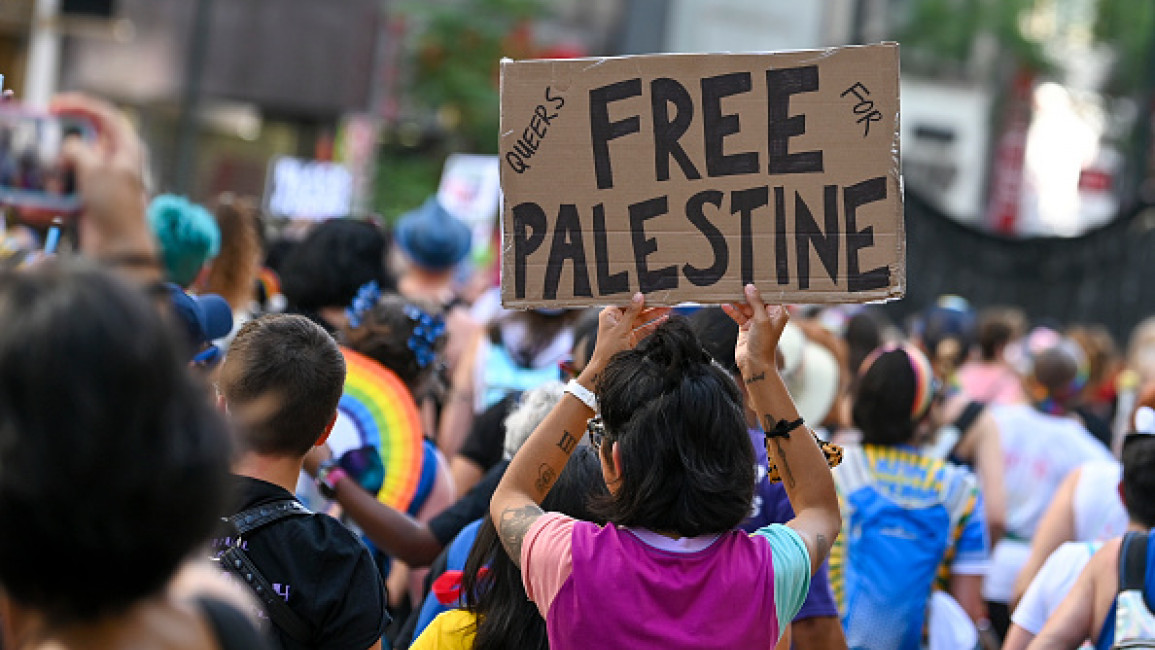
By ignoring the views of LGBTQ+ Palestinians, the Melbourne Queer Film Festival may be complicit in Israel's pinkwashing
Queer cinema, which depicts the lives, stories, and experiences of LGBTQ+ people, attempts to shape our reality into one that is more vibrant and accepting of difference and diversity. As celebrated Palestinian filmmaker Elia Suleiman explains, “We produce culture because we want to think of the possibility that we can better our lives, that we can reduce violence by the production of pleasure.” In other words, queer cinema is a form of cultural production that is inherently political.
This is not the view of the organisers of the Melbourne Queer Film Festival (MQFF) in Australia, who have resisted calls to remove an Israeli state-funded film from their line-up by insisting that they are “apolitical”. Art has real cultural power and this is most famously summarised in a quote sometimes attributed to German playwright Bertolt Brecht: “Art is not a mirror held up to reality but a hammer with which to shape it.”
This year, MQFF chose to include The Swimmer by Adam Kalderon in their line-up. This film received funding from the Israeli Ministry of Culture and Sport via the Israel Film Fund and the MiDarom Film Fund. Both funds attach political requirements to directors and films that are funded, and both require the film to credit the Israeli government.
In response, members of the queer and Palestinian communities, and those like me who belong to both, have called on MQFF to pull the film and adopt a formal policy of cultural boycott.
To be clear, the content of the film is not our contention, nor is, strictly speaking, the country of origin. The issue is the mode of cultural production, where an artist in Israel who might otherwise be well-meaning is given a conditional grant that requires the explicit identification of the film as “Israeli” (meaning that Palestinian citizens of Israel who identify differently can only receive funding if they characterise both themselves and their films as such) and adherence to content guidelines that prohibit a critical view of the State of Israel.
While the individual artist might disagree with Israel’s policies, particularly with respect to the occupation, these funding requirements transform cultural production into propaganda, irrespective of the artist’s own intentions. There can be no ethical partnership with the Israeli state as things stand.
MQFF had originally agreed to meet with us to discuss our concerns, but then unceremoniously rescinded this invitation. Although MQFF would like to characterise us as a fringe movement, two of their own board members have resigned in solidarity with us, and a number of filmmakers have also responded to our call by withdrawing their films from the festival.
As a gay Palestinian, it is frustrating to observe this lack of solidarity on the part of what should be an important cultural institution for queer people in Australia. It has also been frustrating to respond to some of the claims that have been made about queer organising and Palestinians in general.
One particularly pernicious claim is that queer people should withhold their solidarity from Palestine because queer rights are not accepted among Palestinian communities, as though this would somehow excuse the violence inflicted on the Palestinian people over the course of the last seven decades of occupation. This transactional model of solidarity also misses the point of solidarity in the first place, and is a misrepresentation of how social change actually works in practice.
Of course, things could be better. Homophobia exists everywhere, and it is our responsibility to challenge it everywhere, but the fact of the occupation makes substantial social change impossible. The gay liberation movement was won in many parts of the world through protest, but this is out of the question in Palestine where peaceful gatherings are routinely suppressed with violent force by settler gangs and the Israeli military.
Moreover, even if we are to accept that Israel is some kind of “gay haven” (a claim that is much overstated, in any case) it would not change the fact that none of these freedoms is available to the millions of Palestinians who live under an apartheid system of domination. Imagine if apartheid-era South Africa was a gay paradise, but only for Afrikaaners. Would that in any way dilute the moral force or urgency of the anti-apartheid movement?
Ultimately, these retorts come exclusively from people who have no genuine interest in seeing any improvement in the lives of queer Palestinians, or even in listening to us.
But we will not be unheard and unseen in our own movement. We cannot and will not choose between being queer and being Palestinian. We demand liberation on both counts, on our own terms. For us, queer liberation is tied to liberation from the Israeli occupation.
Fahad Ali is a molecular biologist and science educator based in Sydney, Australia. His research is conducted on lands that have been places of teaching and learning for millennia under the custodianship of the Gadigal and Wangal peoples of the Eora nation, sovereignty for which has never been ceded. He is a proud member of the Palestinian diaspora.
Follow Fahad on Twitter: @fahad_s_ali
Have questions or comments? Email us at: editorial-english@alaraby.co.uk
Opinions expressed here are the author's own, and do not necessarily reflect those of her employer, or of The New Arab and its editorial board or staff.



